Compost. The mystical miracle drug that our gardens forever crave. The elusive elixir that can make your tomatoes grow as big as cantaloupes, and make your pumpkins grow as big as coaches. It is the essence that allows new life to spring forth from the death of the old, and you don't buy it, you make it.
If you've been reading my posts and not just perusing the pretty pictures, you've likely learned my love of alliteration. What does that have to do with compost? Nothing at all, but it's a dull, damp, dreary day, and I don't desire to get drenched doing my daily duties, so this post may prove to be a spot ponderous, as I lurch toward the limits of my favorite literary tool.
If you find my meandering to be a trifle too tiresome, just read the paragraphs above the pictures.
Most gardening books will have at least a chapter on composting, and there are even several books devoted completely to the topic. There are recipes and ratios, and unpronouncable names of several bacteria, fungi, and insects. It's all very fascinating, if you're fascinated by science. If you just want to grow healthy onions and don't care about all that other stuff, it's a lot like reading an owner's manual: full of useful information, but impossible to read without falling asleep.
I'm not going to try to teach you any of those things, just how to make your own compost. You won't have to learn any new words, or know what any organisms digest, just put in a little work and patience.
What is compost, really? Basically, it's a bunch of stuff that has decomposed into dirt. There are two tricks to making it without having it smell like a pile of rotting garbage. First, keep it dry. Second, mix it up.
You will need a little space for making your compost. As you can see in the picture below, I'm currently using bins made from old pallets. These are great for keeping things in one place, but they are by no means necessary. You can compost very effectively just by heaping things into a pile on the ground. My first compost bin was just a cylinder made of old snow fence, tied to a small tree to keep it from blowing over. The important thing is to keep your pile as tall as you can. Most of the magic takes place in the middle of the pile, the outside 6"-12" will stay pretty much the same, which is one reason why you have to keep it mixed.
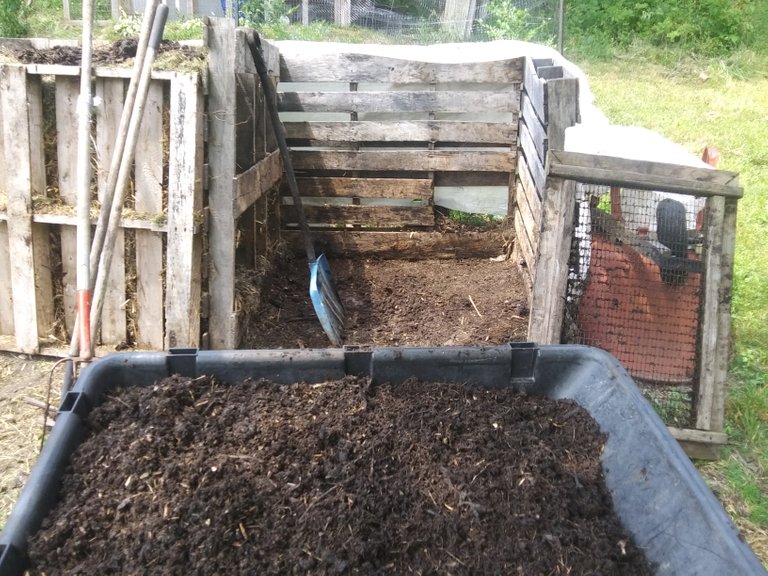
Once you figure out where, you'll need to know what. What what, you ask? What to put on your pile, of course. This is where all that stuff you read will disagree the most, but in my experience, it doesn't really matter that much as long as you keep two things in mind. First, don't throw fried foods or fryer oil on your pile, the oil significantly inhibits the growth of all the little things that turn your yard waste into compost. Second, most people agree that you should avoid adding meat or feces to your pile, because they can grow bacteria that can lead to some pretty serious illnesses. These things can be composted, but it takes a little more care. Small portions of meat like table scraps won't really affect your pile, but if you're butchering your own animals, you're going to need a different method to break down your carcasses and entrails. Regarding feces, there are two exceptions that I know you don't need to worry about adding to your pile, chickens and rabbits. Rabbit feces can be used practically as fertilizer pellets all by themselves, and the old litter from your chicken coop can really help accelerate a pile that has a lot of large items like corn cob or branches. I know many people who have composted both of these things for decades and never had any issues.
What I've found in my years of composting here is that what goes on the pile is less important than how you do it. If you have any lawn, a bagging lawn mower is a great shortcut to fantastic compost. You can compost pretty much anything, including 2" thick burdock stems, fairly quickly if you layer it with lawn clippings. Layering is the important thing. For wetter, larger things, like whole vegetables that have gone bad or kitchen scraps, try to spread things out so that nothing touches, then cover it with at least 3" of something drier, like lawn clippings, pulled weeds, or fallen leaves.
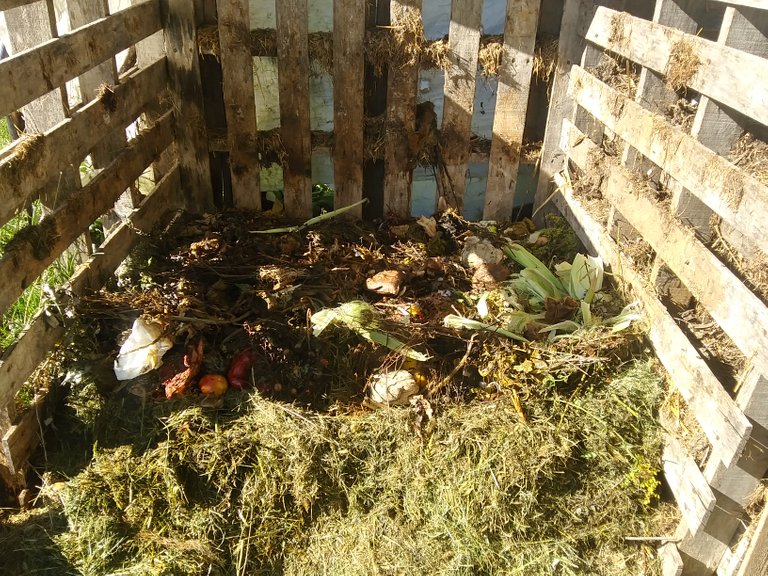
The smaller you can chop things, the faster they will compost for you. This is why I highly recommend the bagging mower. I try to weed wack my edges and pull the weeds from the flower beds and toss them into the yard, then go around and mow everything up with this little guy. It chops everything up nicely, and the bag is small and easy to dump into my bins.
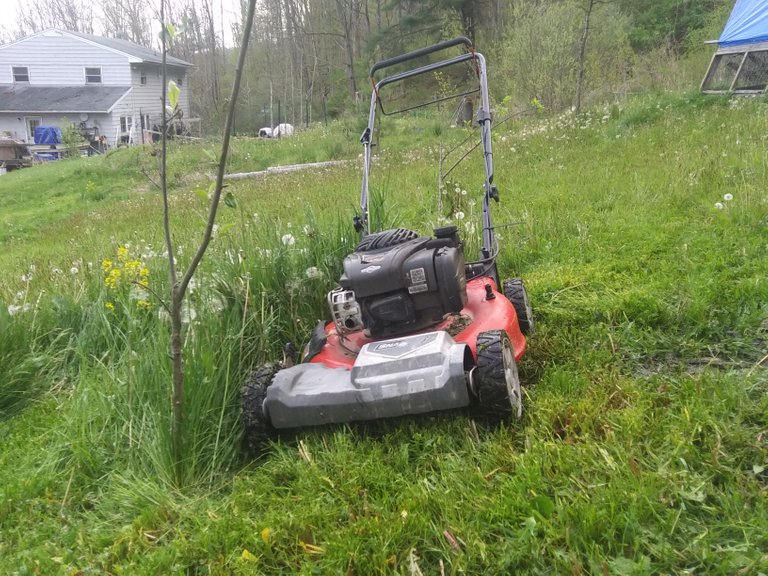
Here you see my vegetables covered with a layer of lawn clippings. This is a minimum that you want to do before putting another layer of vegetables, but the lawn clippings layer can be as deep as you can make it. The bright white bit at the top of the picture below is the plastic that I cover my piles with. Keeping your compost pile dry is the most important factor in keeping the smell down, and keeping the pile easy to work with. This is also why you do single layers of non-dehydrated vegetables; large piles of vegetables will make a very wet, greasy sludge as they decompose. The layers of grass or leaves help spread this sludge out and decompose it much faster.
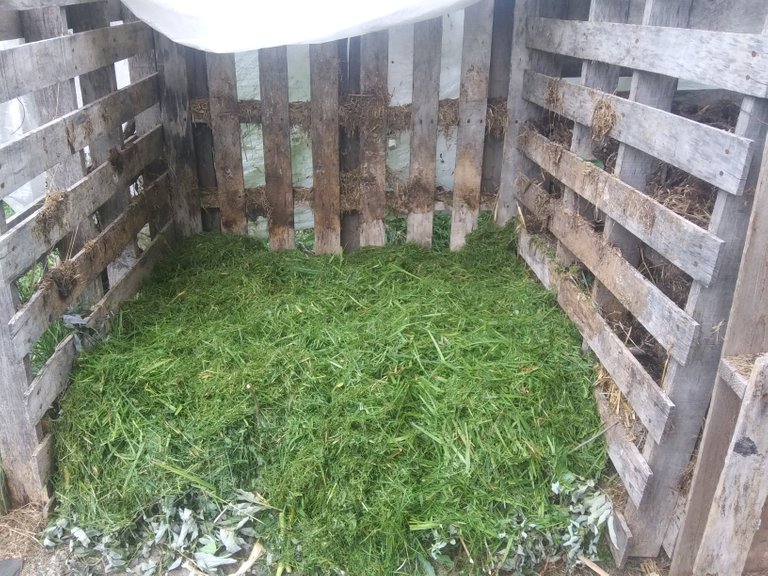
In the picture below, you can see the new pile being built on the left, with a layer of hedge trimmings and pruned branches as well as another layer of lawn clipping added on top. The pile on the right is the pile from last year, and is ready to be screened and used. The pallet in front on the right side will get moved to the left, and I'll continue filling the left side until that pile is ready and it's time to switch back.
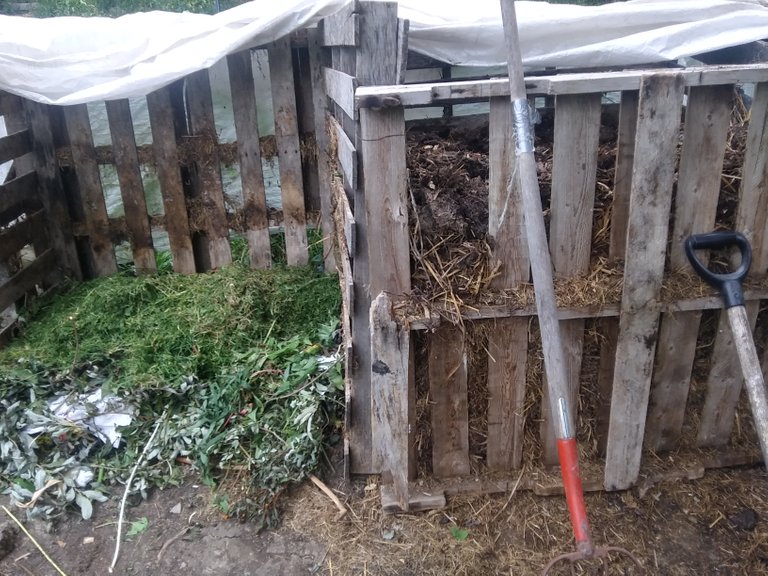
Before using the compost, I like to run it through this screen first. Naturally this gets out larger pieces of branch that are still lingering, the occasional corn cob, odd rock, and other things. Mostly I use it just to fluff up the material and make it easier to work with when I'm planting and potting. Anything that doesn't go through the screen gets tossed into the new compost pile.
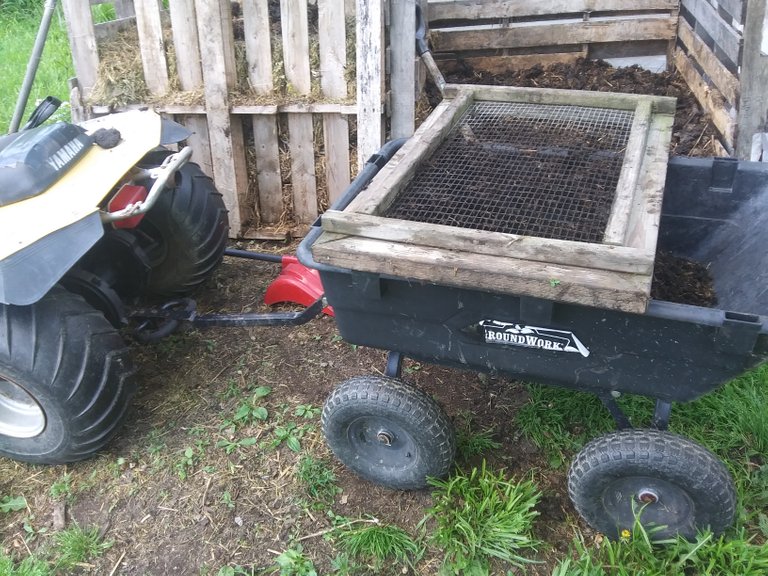
These large cow-pie looking chunks are really just spots that got wet when I left the top off in the rain, then dried into a hard crust on top. The compost doesn't stink at all once it gets to this point, just smells like mulch and dirt. It does generate its own heat as it breaks down, so working a pile in the heat of summer can be very taxing. It will also leave a crust of compost on your hands, so I highly recommend using gloves.
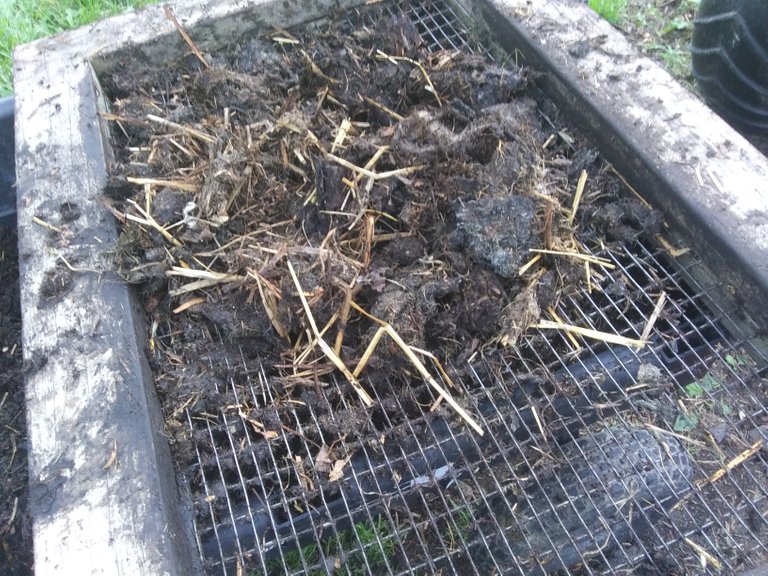
Back to the pile we're building, you'll want to make the pile as large as you can each time you add to it. If you fill a pallet cube to the top on your first fill, it will break down to about half that size in around a week. Each time you fill it, ideally you will want to let it break down for at least 3 days, and then turn it over as best you can before adding more. When turning, all that movement mixes up the microbes, giving the stuff on the outside a chance get broken down. It also helps chop up the material, as partially decomposed stems and branches get broken up. If you have a third bin, you can just toss everything over into that bin before putting in your fresh material, and then toss it back next time you add material. Because I only have the two bins, I usually just mix the top by inserting this 4 prong pitchfork near the edge and giving it a twist.
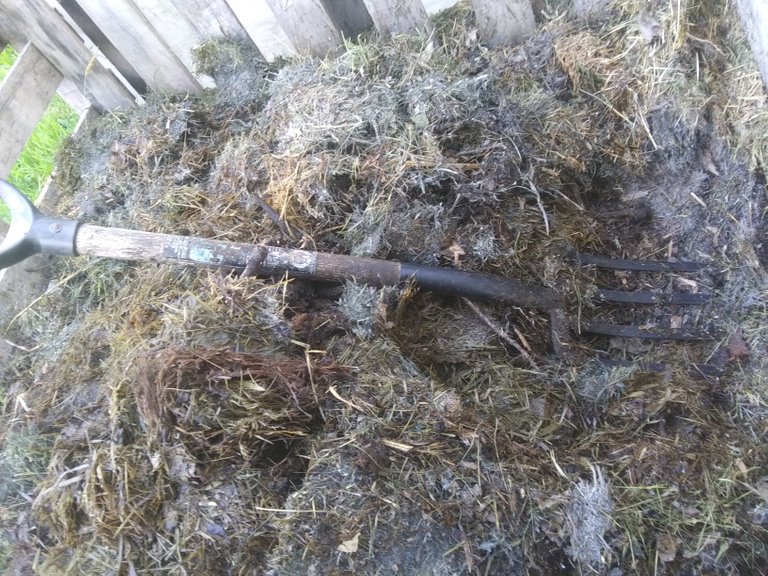
I'll twist all the way along the outside like this, then give everything a good fluff before adding the fresh material. This is very labor intensive, and not absolutely necessary, but it speeds things up considerably. It also helps keep the smell not only down, but often actually pleasant, and just results in better, more uniform compost.
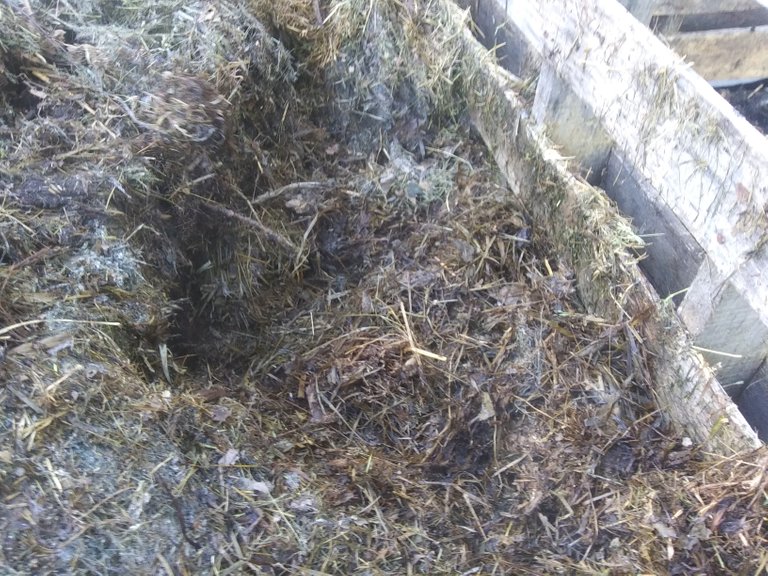
Below is a picture of what my very first bin looked like when I pulled the front off. This was before I would turn the edges like I do now, and is why you can see the layers so clearly. I couldn't tell you for sure if the blacker parts get that color from actually getting burned, but I do know that a large pile can get VERY hot in the center. I've read about people putting coils in their piles to heat water. Another good reason to mix thoroughly is that it helps expose all the weed seeds to this heat, which will kill many of them.
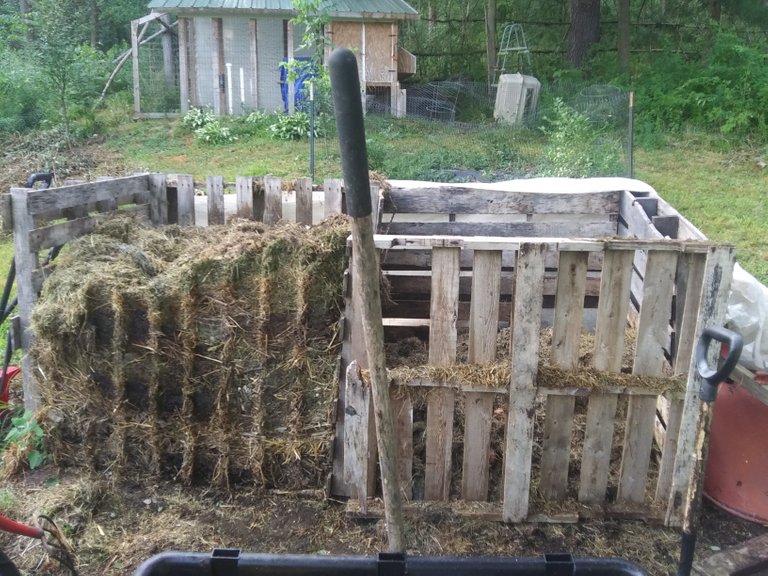
Some seeds that I know will survive composting are asparagus and large red cherry tomato, both of which come up in my compost every year now. Plantain seeds also seem to survive, but it's hard to tell if they're living in the compost or if my plantings are just picking up fresh ones from the yard.
That's really all there is to it. As you continue adding to your pile, a layer of compost will continue to build at the bottom. How much you get in a year will depend on how much and what materials you feed it. In a typical year for me, I'll end up with around a half a bin full of usable compost, which is around 1.5 cubic yards. That would be about 80 of the standard sized bags of compost you might buy at a hardware store, which often isn't really compost at all. If you have chickens, it's good to give them access to piles your once in a while. They'll turn over the top for you, and they'll get a great meal of bugs and worms.
Dead leaves will make a pretty good compost all by themselves with basically no attention at all. Just make a pile, cover it, and wait until it looks like dirt. Leaf piles also attract large amounts of worms, and are a great way to attract some if you have need them.
It sure seemed to take a lot of words to describe something that I assured people was simple. If you count each picture as the 1000 words they're supposedly worth, that's a whole book on composting right there. Well, at least this book didn't cost you $20, or $200 in library late fees. This one didn't cost you anything, unless you tipped me, which I would thank you for. Also, you get to engage with the author in the comments below. Feel free to ask questions, or offer advice. How's that for a bargain?
I hope you learned something. I hope you had fun. I hope you try composting for your own gardens, and I hope to see you all back again! Thanks for reading!
Pretty awesome post here! Too bad it didn't get more engagement, the rewards are great but not a lot of compost lovers it seems lol.
We compost ourselves and it's awesome! We don't do it in the same manner you do, we live in a condo complex so we don't really garden. We tried to do something on our deck but it was too difficult to manage it in the pots where we couldn't rely on the soil having the different nutrients the plants needed without a bunch of intervention from us.
What we have been doing consistently though over the past number of years is composting! We have a bunch of buildings and there are some pretty awesome wooded areas where there is a lot of vegetation and animal life around. We have been composting to the area for years and have had some people complain recently but it's a little annoying. You would rather the food waste be thrown into a trash bin, into a landfill and end up causing more methane emission than keeping it back there where the animals and bugs can eat it, and it get recycled back into the soil? We backed off a little bit and it was very painful but I threw 3 bags of compost into the trash before I started back up in the cloak of darkness lol. Sad what we have to do to save a little bit of unnecessary waste!
I had considered buying one of the composting bins that you can have covered and has a paddle wheel in it so you can turn it over like that. A bit more effort for little reward considering we don't use the stuff actively lol. It's great though to learn and know that actively turning it over keeps the smell down. I don't mind the smell but my wife would certainly not be thrilled by it so knowing that trick will be something I would employ for sure!
I am really looking forward to being able to do this type of stuff when we get a house with some land. 80 bags of the stuff from the hardware store is a really crazy amount of money you could save!
Thanks for the interest, glad you enjoyed it! I don't really get a lot of engagement on my posts, generally. I've been told my whole life that I'm cold, unapproachable, and intimidating... apparently those traits somehow manifest through social media as well :D
Congratulations on your continuing compost quest! I would recommend, if you desire to do more gardening, that you plant some things on top of one of your compost piles. With such a nutrient dense base, you can get a lot of produce in a small area. Do a DuckDuckGo search for Square Foot Gardening, and you'll quickly see the many possibilities.
The drum composters are pretty great, and the internet is full of posts that will show you how to build your own from a variety of materials. If you're just trying to not throw away kitchen scraps, you can also compost quite a bit in 5 gallon buckets. Again, there is a bunch of info about that on the internet, and I hope to do a post about it myself someday.
Thanks for stopping by, hope to see you back again!
I’ve featured your post in The Lotus Garden newsletter, which will be published tomorrow. Your high quality post has also been nominated for an @ocd upvote
Curated for #naturalmedicine (by @minismallholding) - join our community here.
Did you know that you can earn a badge from @hivebuzz for posting about #mentalhealthawareness? Read more details here!
The Lotus Garden is a newsletter supporting content relevant to Homesteaders & supported by Natural Medicine. Earn LOTUS & HIVE for your #homesteading content!
About II Discord II Community
Congratulations @paradoxtma! You have completed the following achievement on the Hive blockchain and have been rewarded with new badge(s) :
You can view your badges on your board and compare yourself to others in the Ranking
If you no longer want to receive notifications, reply to this comment with the word
STOP